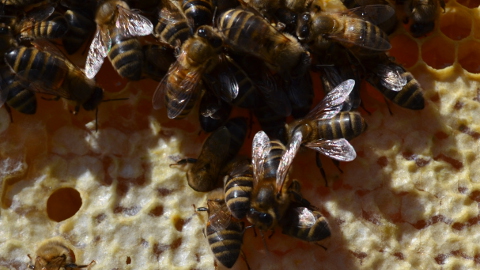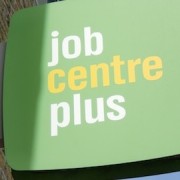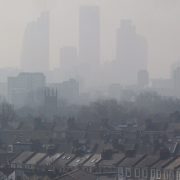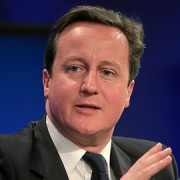Beekeepers and honey bee experts in East London Line Boroughs are on the front line of a national crisis in the insect’s population and doing everything they can to halt its decline. Bees are vital to pollination for the country’s multi-billion pound agricultural industries.
At the same time an urban bee culture has developed in Croydon, Hackney, Lewisham and Tower Hamlets and the insect has gone from pest to trendy pet.
More people are keeping bees in their gardens and urban bee enthusiasts are organising politically as well as evangalising their hobby as a positive contribution to the environment. But as the ELL investigation below reveals, too much bee keeping in the city may not be such a good thing.
Decline of British honey bees
Over the last century the number of honey bees has declined by 75-per cent. Alongside worries that a species of insect may be lost, bees are vital to the country’s eco-system. One in three mouthfuls of the food we eat is dependent on pollination and the economic value of pollination services provided by bees amounts to €265 billion globally.
There has been an ongoing media campaign to raise awareness, including the Bee Cause adverts run by Friends of the Earth and numerous online petitions.
Debate around bee population decline is ongoing, with factors such as the varroa mite and the fall in the amount of suitable habitats being explored. But the most recent research suggests that certain types of pesticide are to blame for bee deaths.
The European Environment Agency made recommendations for a change in policy after research showed that the neonicotinoid chemical, which impacts the central nervous system of insects, was shown to be a contributing factor in bee decline. This has resulted in the European Commission announcing a restriction on the use of three forms of the neonicotinoid chemicals. The European Environment Agency commented that “The ban, while welcomed, is limited in scope and should be seen as only a starting point on the discourse over the use of this class of pesticides.”
A petition of nearly 3 million signatures in support of the ban had been presented to the government and a demonstration called the March of the Beekeepers outside Parliament saw protesters calling for a ban. However, the UK did not vote in favour of the restrictions, stating that more research was needed. Once put into place, the ban will be EU-wide and the UK will not be exempt.
Raising “bee awareness” in East London Lines
East London Lines decided to find out what was being done in the local area to raise bee awareness and to learn how locals can get involved. David Shepherd and Ron Williams are members of the Croydon Beekeepers Association.
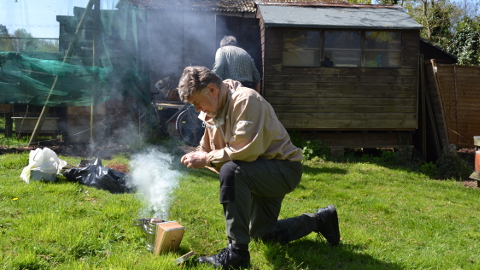
David Shepherd and Ron Williams of the Croydon Beekeepers Association, lighting the smoker Pic: Hannah Newton
Founded in 1879, the group provides a source of information for current beekeepers, whilst also educating members of the public and school groups. Based at a council-owned allotment in Purley, Croydon, the apiary holds the society hives, as well as a number of private colonies. The plot of land has been planted with wild flowers and crab apple hedges, alongside adapted water features, to create a bee-friendly environment. Beekeeper and former science teacher, David Shepherd described that “you never stop learning about beekeeping” and says that the society has protective bee suits and display hives for people of all ages to use and to learn from.
When asked about his own experiences as a beekeeper, David Shepherd said that the current problem of bee decline is a result of a “multiplicity of factors”, but stressed that it was definitely a result of human intervention.
In reference to the decision to restrict neonicotoid David said that he was not completely in favour of the decision. He argued that not enough research has been carried out and that this most recent research has taken the focus away from other factors, such as the varroa.
With the current bee campaigns asking people to get involved, ELL asked The Croydon Beekeepers what they thought locals could do to get involved. Contrary to current trends, David Shepherd said that he does not recommend that Londoners keep bees themselves. He referenced research at the University of Sussex by Professor Francis Ratnieks (the only professor of Apiculture in the country) stating that a square kilometre can only sustain up to five colonies. With over two and a half thousand registered beekeepers in a city of about 1,500 square km, there is not enough forage to sustain the number of hives in London. The association recommends that locals get involved in a different way, by funding and lobbying for more research into a field lacking adequate statistics.
Tim Evans from the Hackney Community Tree Nursery and Edible Forest Garden commented that there are lots of different options for locals who want to help the Bee Cause. Tim suggested that people could think about avoiding using pesticides and buying organic food products. He urged people to plant pollen and nectar bearing plants, saying “A window box is better than nothing, you’ll be amazed what turns up.”

